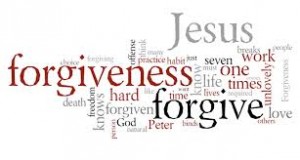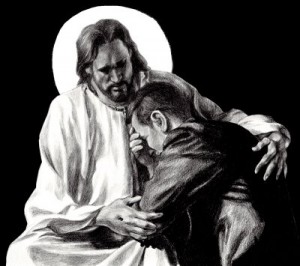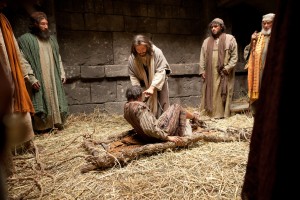1 John 1: 1-10
Second Sunday in Lent
February 21, 2016
 A number of years ago in 1983 a powerful play called The Black Angel by Michael Christopher, explored the thick and thorny problem of human forgiveness. The play was about a former Nazi general whose name was Engel who, after 30 years in prison (he was sentenced at the Nuremberg war crimes trial), was trying to make a new beginning for himself outside of a little village in France. There he begin building a cabin in the mountains for himself and his wife. His past with its horrendous guilt was now forever behind him, paid for, he believed, by three decades in jail. Now he could try to forget it all. He had earned the right to make a new beginning.
A number of years ago in 1983 a powerful play called The Black Angel by Michael Christopher, explored the thick and thorny problem of human forgiveness. The play was about a former Nazi general whose name was Engel who, after 30 years in prison (he was sentenced at the Nuremberg war crimes trial), was trying to make a new beginning for himself outside of a little village in France. There he begin building a cabin in the mountains for himself and his wife. His past with its horrendous guilt was now forever behind him, paid for, he believed, by three decades in jail. Now he could try to forget it all. He had earned the right to make a new beginning.
But there was a French journalist by the name of Morrieaux, who could not forget. His family had been massacred at the start of the war in the village that Engel’s army had overrun. Everybody in the village had been shot dead. No, Morrieaux could not forget. For 30 years he planned revenge. If the Nuremberg court could not sentence Engel to death, Morrieaux would carry out his own sentence. Now after 30 years, the time had come. Morrieaux had gone into the little village and stoked the hatred and the fear in the minds of the village radicals and the crazed, and he did his work well. For on that night they were going to come up there as a mob and kill Engel and his wife, and burn down the cabin.
But there were some loose ends to the story of Engel, some unanswered questions that a journalist had to get an answer to. So the afternoon before the night of vengeance, Morrieaux went to the cabin, identified himself to the shocked Engel, and began an inquisition. All afternoon the inquisition went on as Morrieaux probed into the story. And as Morrieaux got inside of the soul of Engel, Morrieaux’s own soul began to change.
Revenge began to taste sour in his mouth, and he changed his mind. And he said to the former Nazi general, “They’re going to come to you tonight, and they’re surely going to kill you. Come with me. I will save your life. I can get you out of here alive.”
The general waited for a long minute before he answered. And he said to the French journalist, “I will go with you on one condition.”
Morrieaux said, “What’s the condition?”
“That you forgive me.”
“No, no, no. Save you I will. Forgive you I cannot. Never, never, never.”
And that night the villagers came as a mob with the courage of anonymity that comes with wearing a hood over your head. They burned the cabin to the ground and shot Engel and his wife dead.
The play left everyone there gasping for an answer to the question of forgiveness. What was it that General Engel wanted more badly than life itself? What was it that he needed so much that he would rather die than live without it? What was it that Morrieaux did not have the power to give? What is the miracle of forgiveness?
Listen to the promise of our text today: “If we confess our sins, God is faithful and just to forgive us all of our sins.” The Word tells us that God can be counted on to forgive. It is about God’s unfailing grace to do what Morrieaux could not. But God’s forgiving is a model for our forgiving. So what happens between God and a sinner can also happen between two human beings alienated from one another. God shows the way.
We must notice the clos e connection between confessing and forgiving. If we confess, God forgives. But we mustn’t make the converse true as well. The text does not say if you do not confess God will not forgive. Repeat: The text does not say if you do not confess God will not forgive. The text only says that if we do confess, we are assured that God will forgive. What God does with unconfessed sin, we can leave to the mystery of God’s unlimited mercy. This we can seize onto. If we do confess, God surely forgives.
e connection between confessing and forgiving. If we confess, God forgives. But we mustn’t make the converse true as well. The text does not say if you do not confess God will not forgive. Repeat: The text does not say if you do not confess God will not forgive. The text only says that if we do confess, we are assured that God will forgive. What God does with unconfessed sin, we can leave to the mystery of God’s unlimited mercy. This we can seize onto. If we do confess, God surely forgives.
What is a confession? And what is forgiveness? I am indebted to Lewis Smedes, late professor of theology and psychology at Fuller Theological Seminary for these insights. He has explored these questions deeply in a book entitled, Forgive and Forget: Healing the Hurts We Don’t Deserve. So I invite you for a few moments to hang tough with me as we probe deeply into these two questions. What is it to confess? And what is it to forgive?
What is a confession? First, I want you to brush aside some of the pious debris that can clutter up the reality of a confession. Let me mention three things that confessing is not. Confessing is not talking about sin. If talking about sin were confessing sin then our society would be on a confessional binge. Charlie Sheen confessed he has AIDS, Bruce Jenner confessed he was transsexual, VW confessed they rigged their cars so their CO2 output could not be measured, and Josh Duggar of the show 19 Kids and Counting confessed that he used a website designed to cheat on his spouse. Grocery stores sport the latest misdeeds of celebrities or politicians in the tabloids at the checkout aisle. Fortunes are made on the premise that you and I are peeping Toms at heart. I continue to be amazed at people’s readiness to divulge their private peccadilloes to the likes of Dr. Phil and to a few million eaves-droppers. But blabbing our secrets is not confession. Spilled beans do not yet a confession make. Talking about sin is not the same as confessing it.
Second, confessing sin is not the same as explaining it. I am more than willing, like most of you I imagine, to try to explain my faults. I want everybody to understand me and appreciate the extenuating circumstances under which I was practically forced to do the crazy things that I sometimes do. I want you to know that I’m not a terrible fellow. I can explain everything. Well, that afternoon on the mountaintop General Engel explained. Morrieaux should know what it was like to have been a German general under that lunatic Adolph Hitler. You might gain insight and under-standing, even compassion, but it’s not confession.
Third, confessing sin is not the same as being realistic about it. If realism were the same as confession, our society would be pros at it. Tell all books, crying admissions on television, grizzly 24/7 coverage of natural disasters, and public acknowledgement of behavior that would once have made us blush, are now common place. Realism makes us honest. It makes us tough. It makes us callous, but it does not make us confessors of our sins.
If confessing is not the same as blabbing, not the same as explaining, and not the same as being realistic, what in heaven’s name is it? I think that confession always includes three essential qualities.
The first one is an acknowledgement of our responsibility. To confess is to acknowledge responsibility. Let me say upfront that as I’ve grown older, been in ministry for some 25 years, and seen more tragedy, I am convinced that people are as often sinned against as much as they sin. They’re as often victims as they are culprits. We’re victims of many forces. I don’t know just how much you can blame on your genetic makeup, or how much you can blame on your lousy psychological childhood environment. I don’t know how much you can blame on something else. But this I believe—that somewhere in the matrix of your decisions, somewhere in the dynamics of your actions, you decided, you chose, you determined what you should do. It’s not my mother, not my father, not my toilet training, but it’s me, O Lord, standing in the need of prayer. And I have not confessed until I have acknowledged my responsibility even though I might not be fully sure of what it is.
Second, and this is most crucial, confession is shared pain. When I truly confess to you that I have hurt you, I am saying to you that the hurt that I caused you now hurts me, too. I feel the pain that I inflicted upon you. I wounded you, and now I am wounded by the cuts that I sliced into your life. Only when pain is shared does confession begin.
Third, confession is a gamble on grace. How do you know when you’ve held out your heart and you’ve held out your soul in your hand for the other person to look at it with all of its flaws—how do you know that the other person will not look at it and find in it reason to shut the door in your face? What a huge risk! That’s the risk of love and of vulnerability.
Every confession is acknowledgement of responsibility, the feeling of shared pain, and a risk and a gamble on the other person’s grace. With these any confession can be the beginning of a miracle that tears down a wall and builds a bridge over which you can meet each other and begin again.
What then is the miracle that happens after confession is made, when one confesses and the other forgives? Again, we need to brush away some misconceptions that can clutter up the reality of forgiveness and keep its miracle from our eyes. Let me mention two things.
Forgiveness is not forgetting. Forgiveness is hard; forgetting is easy. It’s not painful. You need no miracle of grace to get you to forget. All you need is a bad memory or fear enough to force you to drive the memory into the dark pit of your unconscious. If God could have forgotten, we would not have needed a cross. God could have just said, “It doesn’t matter, I’ve forgotten it.” Forgetting is not forgiving. Forgiving is remembering and still forgiving.
Second, forgiving is not excusing. Oh, we all need a lot of excusing for the dumb things we do. I know that I want to be excused for arriving late because I’m so busy. I have so many things going on, so many responsibilities, so much to get done—of course, you understand. Nobody dares to not excuse us pastors because, after all, we’re doing the Lord’s work. So I’ve got it made on the question of excusing. But we all excuse each other for so many things. I know you’re a flake, but you’re my kind of flake. My husband is a clod, but with the mother he had to grow up with, what would you expect? You see, excusing is easy and sometimes it’s entirely appropriate for those mistakes we all make just for being human. But excusing can also be an end run around the pain and the challenge of forgiveness. You can excuse almost anything if you understand it well enough.
 If forgiveness is not forgetting and if forgiving is not excusing, what in heaven’s name is it? What happens when God forgives a sinner? What happens when a hurting person forgives the person who hurt her? Forgiveness at bottom is a very simple miracle. It is the miracle of a new beginning, a new beginning starting at the moment where you are, not where you wish you were but at the place you are together, to begin again. When you truly forgive someone you hold out your hand and you say, “I cannot excuse what you’ve done. I cannot fully understand what you’ve done. I cannot forget what you’ve done. But here’s my hand. I want to be your friend again. I want to be your husband again. I want to be your mother again. Let’s begin over.”
If forgiveness is not forgetting and if forgiving is not excusing, what in heaven’s name is it? What happens when God forgives a sinner? What happens when a hurting person forgives the person who hurt her? Forgiveness at bottom is a very simple miracle. It is the miracle of a new beginning, a new beginning starting at the moment where you are, not where you wish you were but at the place you are together, to begin again. When you truly forgive someone you hold out your hand and you say, “I cannot excuse what you’ve done. I cannot fully understand what you’ve done. I cannot forget what you’ve done. But here’s my hand. I want to be your friend again. I want to be your husband again. I want to be your mother again. Let’s begin over.”
When we’re ready to forgive we do not have to understand everything. We do not have to get the story straight. We don’t have to sew all the loose ends together in our minds. All we need to do is to begin where we are in our shared pain and determine to walk into the future together.
What future? Who knows—it may be a future where we will have more pain, we’ll hurt each other again which will require more confessing, and more new beginnings. We never settle it once and for all. Forgiveness does not guarantee a painless future between us. Nor can forgiveness turn back the clock. We have to begin where we are, and sometimes that means that we have to begin a brand new relationship.
Whatever the quality of the moment, whatever the status of the relationship, when you sense that another person has shared the pain that he or she has caused you, you are ready to forgive if you have grace enough to do it. And there’s the rub. As long as we are relating as sinful persons to sinful persons, confession is such a great risk. I may not have the grace to forgive you. You have to risk it with me.
So where do you need to take a risk this morning? Who do you have to forgive? From whom do you have to ask forgiveness? I’m always amazed when people are confounded that there is sin in our churches. “I can’t believe how cruel he was.” “They left the church over that?” “How can people who call themselves Christians do such a power play?” “An affair? I can’t believe it.” Yes, we’re rightfully disappointed. We wish it could be better. We do have a higher calling and we should be models of a new humanity created in Christ. But we’re a hospital for broken wounded people, not just a way station for saints.
I know there’s been conflict here in the past year and before that. There was a rift over same-gender marriage. Some didn’t like the process—they thought it was a done deal. Others didn’t know why it was taking so long, it shouldn’t even be an issue. Some were angry that the subject even came up and others thought it didn’t go far enough. There was sharp disagreement over the best way to develop the Friendship Garden. People said and did things that were hurtful. Things that are regrettable. Differences of opinion that could have been handled better. Actions that were not intended to be hurtful, but nevertheless were. But you know what? Everybody wants the same thing. Everyone wants a church that is welcoming to all and struggles with tough issues of the day. Everyone wants a beautiful garden—a place for prayer and reflection, for beauty. Everyone wants to sing their hymns at the top of their lungs be they classic hymns or contemporary praise songs. But we have different ways of getting there or understanding what it means or what the best path might be. Forgiveness, reconciliation and moving on are an important part of the interim time. Let’s try to make the most of it.
The gospel this morning is that with God all risk is removed. If we confess, God is faithful and fair to forgive us all of our sins. We can depend upon it. There’s no gamble. What makes the difference? The difference is a cross set in the soil on a Palestine hill, where a man once hung in shared pain for the sins of the world. God drove deep into our human predicament in Jesus. God came and shared “our common lot,” as our UCC Statement of Faith puts it. In Jesus, God knew what it was like as a human being to be sinned against, to be misunderstood, to be disappointed, to offer one’s heart to another and have it stomped on. Jesus was fully human and as such he understood the pain we caused God’s heart.
As our representative, Jes us in his suffering held out his pain to God as though he were saying, “O God, the pain that the human race caused you I am feeling with you now. I share your pain, O God. And we are so sorry.” And in the sharing of pain on the cross for us, Jesus made a perfect confession of sin for the whole human race. The cross in God’s light is the guarantee of a new beginning for us. The closer we get to the things Jesus’ cares about, the closer we get to the pain that God must feel when we brutalize one another.
us in his suffering held out his pain to God as though he were saying, “O God, the pain that the human race caused you I am feeling with you now. I share your pain, O God. And we are so sorry.” And in the sharing of pain on the cross for us, Jesus made a perfect confession of sin for the whole human race. The cross in God’s light is the guarantee of a new beginning for us. The closer we get to the things Jesus’ cares about, the closer we get to the pain that God must feel when we brutalize one another.
There is a cross of shared pain in the life of God. This is why God can be trusted never to shut the door, never to turn away. God can be relied on not simply to excuse us, not simply to forget, not simply to understand but to know and remember everything and still say to us, “Here’s my hand. I want to be your God again. I want to be your friend again. I want to be your fellow traveler into the future with you. Let us begin again.”
